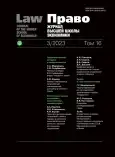Legal Regulation of Smart City Technologies in Solving Local Issues in Urban Areas
- Authors: Larichev A.1, Kozhevnikov O.2,3, Korsun K.3
-
Affiliations:
- National Research University Higher School of Economics
- Ural State Law University
- Ural State University of Economics
- Issue: Vol 16, No 3 (2023)
- Pages: 56-77
- Section: Russian Law: Condition, Perspectives, Commentaries
- URL: https://journal-vniispk.ru/2072-8166/article/view/318255
- DOI: https://doi.org/10.17323/2072-8166.2023.3.56.77
- ID: 318255
Cite item
Full Text
Abstract
About the authors
Aleksandr Larichev
National Research University Higher School of Economics
Email: noreply@hse.ru
ORCID iD: 0000-0002-6452-6787
Doctor of Sciences (Law), Professor
Oleg Kozhevnikov
Ural State Law University; Ural State University of Economics
Email: noreply@hse.ru
ORCID iD: 0000-0003-1371-7249
Doctor of Sciences (Law), Professor
Ksenia Korsun
Ural State University of Economics
Email: noreply@hse.ru
ORCID iD: 0000-0003-4160-7338
Senior Lecturer
References
- Alexandrov N.D. (2020) The state management of smart cities: domestic practice and international experience. Innovatcii i investitcii= Innovations and investments, no. 4, pp. 73-78 (in Russ.)
- Ashby M. (2017) The value of CCTV surveillance cameras as an investigative tool: an empirical analysis. European Journal on Criminal Policy and Research, vol. 23, issue 3, pp. 441-459. DOI:https://doi.org/10.1007/s10610-017-9341-6
- Brosalina A.A. (2020) Legal foundations of smart city development: federal and regional aspects. Derzhavinsky forum=Derzhavin Forum, vol. 4, no. 14, pp. 9-15 (in Russ.)
- Dinakin N.S. (2012) Conceptual model of Smart city. Upravlenie gorodom=Urban Management, no.1, pp. 19-27 (in Russ.)
- Komarevtseva O.O. (2017) On readiness of municipalities to implement Smart City technologies. Vestnik Adygeiskogo universiteta=Bulletin of the Adygea University, no. 1, pp. 23-41 (in Russ.)
- Kondratenko Z.K. (2020) Legal regulation of Smart City technologies in the conditions of digitalization. Agrarnoe i zemelnoe pravo=Agrarian and Land Law, no. 12, pp. 45-48 (in Russ.) DOI:https://doi.org/10.47643/1815-1329_2020_12_45
- Lawson T. et al. (2018) Comparison between cost of CCTV and improved street lighting as a means of crime reduction. Computers, Environment and Urban Systems, vol. 68, pp. 17-25. DOI:https://doi.org/10.1016/j.compenvurbsys.2017.09.008
- Lipchanskaya M.A., Ostrannova E.A. (2020) Social rights in «smart city» and artificial intelligence use in urban environment: legal regulation of the concept and implementation. Pravovaya politika i pravovaya zhizn=Legal Policy and Legal Life, no. 4, pp. 149-160 (in Russ.)
- Mazein A.V. (2020) Legal definition of the Smart City project as a form of management activity organization. Pravo i praktika=Law and Practice, no. 4, pp. 67-75 (in Russ.)
- Mills D., Pudney S. et al. (2022) Evidence-based public policy decision-making in smart cities: does extant theory support achievement of city sustainability objectives? Sustainability, vol. 14, pp. 1-23. DOI:https://doi.org/10.3390/su14010003
- Pekhova L.S., Gafarova D.A. (2020) Development of citizens' activity in solving local issues in the municipalities of the Kaliningrad area. Upravlencheskoe konsultirovanie=Managerial Consulting, no. 4, pp. 108-115 (in Russ.) DOI:https://doi.org/10.22394/1726-1139-2020-4-108-115
- Puzanov K.A., Shubina D.O. (2019) “Smart city” or “Smartness” of the city: effectiveness of USA urban innovations. Gorodskie issledovania i praktiki=Urban Studies and Practice, no. 1, pp. 29-42 (in Russ.)
- Truntsevsky Y.V. et al. (2018) A smart city is a safe city: The current status of street crime and its victim prevention using a digital application. In: Proceedings of the International Conference on Business Technologies for Sustainable Urban Development. Article 01067, pp. 1-10. DOI:https://doi.org/10.1051/matecconf/201817001067
- Veselova A.O. et al. (2018) Prospects of creating “smart cities” in Russia: systematization of issues and directions of solution. Vestnik Permskogo universiteta=Bulletin of Perm University, no. 1, pp. 75-89 (in Russ.) DOI:https://doi.org/10.17072/1994-9960-2018-1-75-89
- Yesayan A.K., Truntsevsky Yu. V. (2020) Approaches to regulatory legal regulation of technologies in the field of “smart city”. Miezhdunarodnoye publichnoe i chastnoe pravo=International Public and Private Law, no. 1, pp. 36-41 (in Russ.)
Supplementary files








